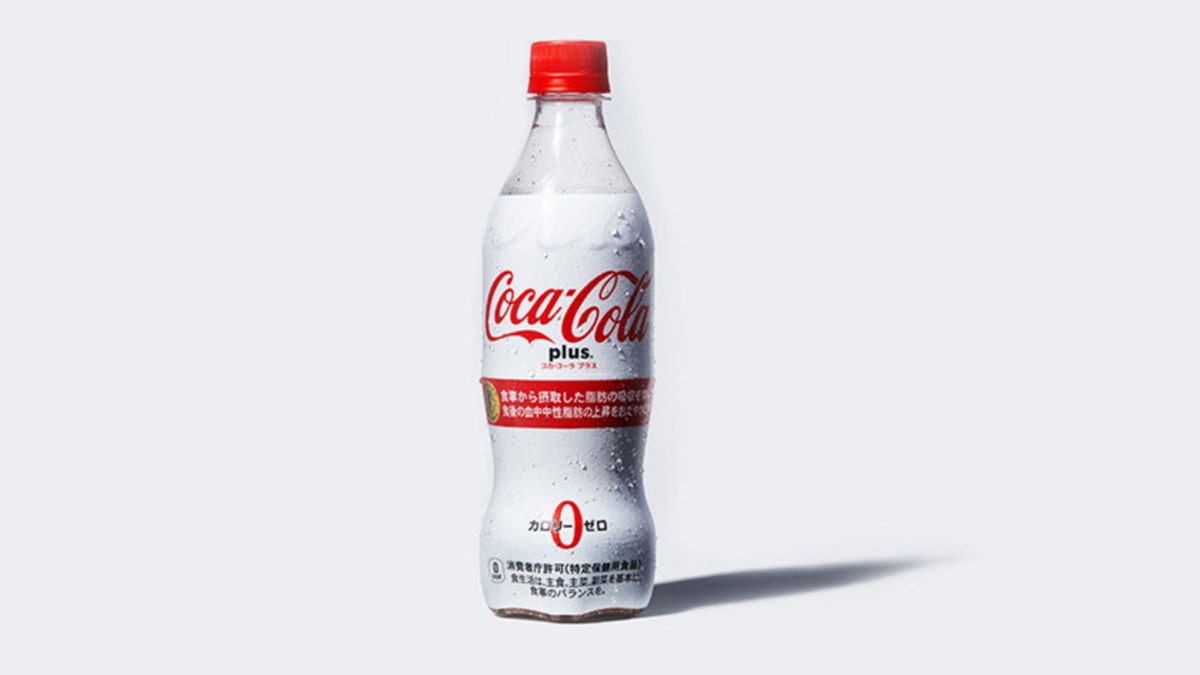
(Courtesy Coca-Cola Japan)
Coca-Cola wants soda drinkers to be regular.
Of course, they want customers to buy their products often but they also want your insides to, you know, move regularly, too.
The soda giant is now selling a sugar-free, calorie-free cola with added fiber. Though only available in Japan currently, Business Insider reports that the company spent over 10 years developing the sparkling Metamucil-inspired beverage: Coca-Cola Plus.
It contains five grams of fiber, which accounts for about a fifth of one’s recommended daily needs.
"We're looking to add functional beverages," Coke’s president and CEO James Quincy told reporters Tuesday.
PEPSI PUSHING BACK ON PHILLY SODA TAX
The company is also rolling out a fiber-enhanced version of Canada Dry ginger ale, too.
But is this something consumers even want?
"I doubt it, although it depends on how it tastes," Marion Nestle, professor of nutrition, food studies, and public health at New York University told Fox News. "People who like Coke don’t want it tampered with. People who don’t won’t care. Those seeking fiber can find other sources."
Nutrionists aren’t sold on the new beverage, either.
Felicia Stoler, a registered dietitian nutritionist and expert consultant in disease prevention and healthful living, thinks that while the "functional beverage" space is hot, she's not sure that a soda will help alleviate the substantial lack of fiber missing the average Western diet.
"I do think it is great that Coke has added fiber to its beverage," Stoler told Fox News, "however, from what i can find, it is a corn-derived fiber... so not sure if this this the best option to meet their goals for all consumers."
According to Stoler, the typical American gets less than 10 grams of fiber per day. She advocates for consuming more wholesome fruits and veggies.
Long thought to be healthier than sugary soft drinks, diet drinks may not actually be better for us after all. A study conducted by Boston’s University School of Medicine found that people who consume just one can of an artificially-sweetened soft drink a day were three times more likely to suffer the most common form of stroke compared to non-drinkers. The study, which examined 4,300 people over 10 years, also found that soda drinkers were also 2.9 times more likely to develop Alzheimer’s.
It’s a worrying statistic that some extra fiber isn’t likely to fix.
"I do not believe the fiber would offset the negative consequences of what makes the diet soda diet-- which is the non-nutritive sweetener," says Stoler, who advocates against artificial sweeteners in general.
In today’s increasingly health conscious climate, it will likely take some clever marketing to convince consumers that a soda is actually healthy.
So who is Coke targeting?
"People who think Coke is bad for them and that this will make it better," says Nestle, who added, "Good luck with that."
Coca-Cola and PepsiCo are both looking for new ways reverse declining sales. Though Coca-Cola grew its sparkling soft drink revenue last quarter, by volume, global soft drink sales fell by 1 percent for the company, says Business Insider.
FOLLOW US ON FACEBOOK FOR MORE FOX LIFESTYLE NEWS
Ultimately, as nestle believes, the product's success will likely come down to taste. While Coke has had success with low-calorie and calorie free brands like Coke Zero and Diet Coke, when the company introduced the reformulated “New Coke” in 1985, it resulted in an epic brand identity crisis and ultimate sales flop.
The company seems to have learned from that mistake, however, and going forward isn’t looking to necessarily replace any of its most popular beverages, but rather give a sophisticated drinker more options depending on his or her mood.
"Consumers, even the same person... want less sugar at one point, more caffeine, less caffeine [at other times,]" Quincy said. Coca-Cola, he said, "can actually have multiple objectives in the same reformulation. You can... improve the taste, and reduce the added sugar, and add a new fruit juice or some other ingredients."




















